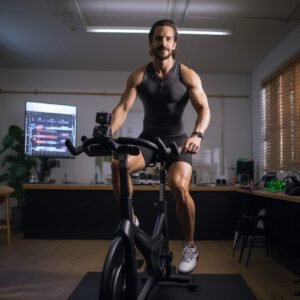
How to Optimize Your Health through Biohacking
Introduction
In today’s fast-paced world, many individuals are seeking ways to optimize their health and enhance their overall well-being. One emerging trend that has gained significant interest is biohacking. Biohacking involves making targeted changes to your lifestyle, diet, exercise routine, and more to improve your health and unlock your full potential. In this article, we will explore the concepts of health optimization biohacking and provide practical tips on how to incorporate it into your daily routine.
Key Concepts of Health optimization biohacking
Biohacking encompasses various key concepts that can greatly impact and optimize your health. Some of these include:
Concept 1: Nutrition
Optimizing your nutrition is a fundamental aspect of biohacking. It involves consuming nutrient-dense foods that support your specific health goals. Consider incorporating a balanced diet rich in whole foods, such as fruits, vegetables, lean proteins, and healthy fats. Experiment with personalized dietary approaches like intermittent fasting, ketogenic diet, or plant-based eating to determine which one works best for you.
Concept 2: Sleep Optimization
Sleep plays a crucial role in our overall health and well-being. Biohacking sleep involves establishing a consistent sleep schedule, creating a soothing sleep environment, and implementing relaxation techniques before bed. Consider using sleep-tracking devices to monitor your sleep quality and make necessary adjustments to promote better overall sleep.
Concept 3: Exercise and Movement
Regular physical activity is key to optimizing your health. Biohacking exercise involves finding the right balance between cardiovascular exercise, strength training, and flexibility work. Incorporate high-intensity interval training (HIIT), resistance training, and mindful movement practices like yoga or Pilates into your exercise routine. Additionally, consider using wearable fitness devices to track your progress and fine-tune your workouts.
Concept 4: Stress Management
Managing stress is crucial for achieving optimal health. Biohacking stress involves incorporating stress-reduction techniques into your daily life. This can include practices like meditation, deep breathing exercises, mindfulness, and engaging in hobbies or activities that bring you joy and relaxation.
Concept 5: Technology in Biohacking
Technology can be a valuable tool in the biohacking journey. From fitness trackers and sleep monitoring devices to smart nutrition apps and biofeedback devices, there are numerous technological advancements that can aid in optimizing your health. Explore the various biohacking gadgets and apps available in the market to find the ones that align with your health goals.
Practical Biohacking Tips
Ready to start biohacking your way to optimal health? Here are some practical tips to incorporate into your daily routine:
- Prioritize nutrient-dense foods: Fill your plate with whole, unprocessed foods like fruits, vegetables, lean meats, and healthy fats.
- Establish a consistent sleep schedule: Aim for 7-9 hours of quality sleep each night and create a relaxing bedtime routine.
- Move every day: Incorporate a combination of cardiovascular exercise, strength training, and flexibility work into your routine.
- Practice stress reduction techniques: Experiment with meditation, deep breathing exercises, or engaging in activities that bring you joy and relaxation.
- Utilize biohacking technology: Explore wearable fitness devices, sleep trackers, and smart apps to monitor and optimize your health.
Remember, biohacking is a personalized journey, and what works for one person may not work for another. It’s important to listen to your body and make adjustments along the way to find what optimizes your health best.
Biohacking FAQs
Question 1: Can biohacking help with weight loss?
– Answer: Biohacking can support weight loss efforts by optimizing nutrition, exercise, and sleep. By incorporating personalized dietary approaches, exercising regularly, and prioritizing quality sleep, individuals may experience improved weight management outcomes.
Question 2: How long does it take to see results from biohacking?
– Answer: The timeline for seeing results from biohacking varies depending on individual factors, goals, and the specific biohacking changes implemented. It’s important to be consistent and patient, as sustainable changes often take time to manifest.
Question 3: Is biohacking safe?
– Answer: When done responsibly and with guidance from healthcare professionals, biohacking can be safe. However, it’s important to approach biohacking with caution and prioritize your overall health and well-being.
Question 4: Can biohacking improve mental health?
– Answer: Biohacking techniques like meditation, stress reduction, and optimizing sleep can positively impact mental health. However, it’s important to consult with a healthcare professional for comprehensive mental health support.
Question 5: Is biohacking a replacement for medical advice?
– Answer: No, this article aims to provide informational content and does not substitute for professional medical advice. It’s crucial to consult with healthcare professionals before making significant changes to your lifestyle or health-related practices.
Conclusion
Biohacking offers a unique approach to optimizing your health and well-being. By incorporating concepts like nutrition, sleep optimization, exercise, stress management, and technology, you can embark on a personalized journey of biohacking. Remember to approach biohacking with caution, prioritize your overall health, and consult with healthcare professionals when necessary. Start exploring the world of biohacking today to unlock your full health potential and enhance your overall quality of life.
Disclaimer: The information provided in this article is for informational purposes only and should not be considered medical advice. Always consult with healthcare professionals before making significant changes to your lifestyle or health-related practices.


